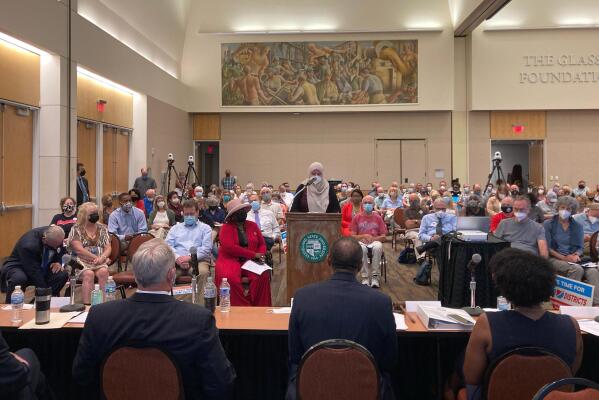Witnesses malign Ohio’s gerrymandered maps at hearing
CLEVELAND (AP) — More than 120 activists, scholars, pastors, students and average citizens attended the first hearing Monday of a new panel charged with redrawing Ohio’s state legislative districts for the next 10 years, most advocating new maps that are more fair and representative.
Witnesses at the first of nine public hearings of the Ohio Redistricting Commission at Cleveland State University maligned the current gerrymandered maps and called the process disheartening, embarrassing, demoralizing and unfair.
“My vote doesn’t count,” Daisie Reish, 77, of Grafton, told the panel. “I call my representatives constantly and they never vote for me. They always vote the opposite.”
Person after person — young, old, Black, Muslim, immigrant and people whose families have lived in the area for generations — told the panel they feel disadvantaged and unheard by their government as a result of the current district maps.
Tom Hach, executive director of Free Ohio Now, which has opposed some COVID-related business restrictions, called the hearings stacked against Republicans because they are all being held at universities. He said the majority-Republican commission was being bullied by Democrats, despite their party winning only 7 of Ohio’s 88 counties in the 2020 presidential election. While the figure was correct, those seven counties are also home to almost half of the state’s population.
An Associated Press analysis found that Republican politicians used census data after election victories 10 years ago to draw voting districts that gave them a greater political advantage in more states than either party had in the past 50 years. Voters in Ohio have some of the nation’s most gerrymandered maps, the AP found.
Those voters approved constitutional amendments in 2015 and 2018 that created a new process for drawing both state legislative and congressional district maps this year and set up the independent commission.
Some in the audience heckled Hach as he was speaking and one man called him out for not wearing a mask, prompting a visit by security. Later, Chibuzo Petty, 31, of Middleburg Heights, though an advocate for fairer districts, said it was wrong for the group to chide Hach and that the timing and location of the daytime hearing meant it was dominated by “liberal elites” who are either retired or have the privilege of taking a day off work.
Christos Ioannou, 20, of Shaker Heights, likened his feeling living in a majority-Democratic area represented mostly by Republicans to a scene in “Twilight Zone,” where a man sees a gremlin on the wing of a plane and no one else does.
“I just want you to see how messed up this all is, how disturbing it is, how undemocratic it all is, because this has to be representative,” he testified. “What’s been going on this past decade, it’s disgusting, it’s abhorrent and it scares me that so many people are willing to show up today and speak out against this and odds are it stays the same or gets worse.”
Participants also complained that the public hearings were only scheduled days before an initial Sept. 1 deadline. The panel must finish redrawing legislative districts by then, a feat they have admitted will be difficult to impossible.
Commissioners have blamed the scheduling issues on the delayed release of 2020 Census data. Maps loaded with the new Census data are still being assembled by experts at Ohio University.
The General Assembly has to complete a new map of the state’s congressional districts, which will be reduced from 16 to 15 as a result of lagging population growth, by Sept. 30. The panel would only get involved in that second process if state lawmakers cannot come to an agreement.
High-profile commission members — including the House speaker, Senate president, governor and secretary of state — sent surrogates to Monday’s meeting, leaving Democratic co-chair Sen. Vernon Sykes, of Akron, to lead the hearing. State Auditor Keith Faber was the only statewide member to attend.
At an afternoon hearing in Youngstown, DeWine was criticized for choosing to attend a Cincinnati Bengals practice rather than the hearing. Spokesman Dan Tierney confirmed the Republican governor’s whereabouts. He said in a text that he understands the hearings all this week to be part of a “staff level listening tour” and that DeWine will review all submitted materials.
Jen Miller, executive director of the Ohio League of Woman Voters, called the governor’s decision “a profound dereliction of duty given the fact that these maps will determine representation for voters for up to a decade.”
John Fortney, a spokesperson for Republican Senate President Matt Huffman, said Huffman felt it was best to send senators from each of the areas where the hearings are being held and that was the case Monday.
The forums will continue through Friday, with visits to Dayton and Cincinnati on Tuesday, Zanesville and Rio Grande on Wednesday, Lima and Toledo on Thursday, and Akron and Mansfield on Friday.
Full details are on a newly launched website. The forums will also be broadcast live on the state-funded Ohio Channel.




